Future Tense, Imperfect: An interview with Ewan Morrison
To celebrate the release of techno-thriller FOR EMMA, Bram and Ewan discuss transhumanism, accelerationism and the singularity for Glasgow Review of Books
Ewan Morrison’s new novel For Emma is out this week — a stunningly prescient techno-thriller that resonates with a whole host of today’s most urgent concerns, from the cultic techno-optimism of Marc Andreessen and Elon Musk, to the political violence carried out by Luigi Mangione, to the fever dreams of accelerationism, transhumanism and the singularity.
We spoke a little about the novel and its subject matter in Episode 22 of Strange Exiles, and on Sonic Book Club. Now, to celebrate the novel’s publication, Ewan and I talked again — this time for Glasgow Review of Books. I approached this piece experimentally… click through to read the whole thing, which is beamed to you from the near-future dystopia of For Emma.
These big tech gurus and their followers believe that they can force AI superintelligence and other imaginary science-fiction technologies to emerge via an act of collective faith, and by the whipping-up of hype to generate hundreds of billions in speculative capital to ‘make the fiction become real – to make the dream come true’. It’s a Californian ideology that fuses the beliefs of ‘the law of attraction’ – as seen with people like Oprah Winfrey, and her belief in ‘manifesting’ wealth and health – and the old American Power of Positive Thinking, with the equally cult-like and euphoric tech utopianism that has grown out of Silicon Valley, and which is now articulated by tech gurus like Marc Andreessen and Elon Musk. Andreesen even wrote a techno-optimist manifesto. The result is that the fastest growing speculative economy in the world is now being led by science fiction, the acolytes who believe in it, and the investors who are duped by it.
Read the full interview at Glasgow Review of Books.







I suppose I wonder— have we come to think of “leftism” and “a society which works for the majority of humans” as the same thing, and what happens if this turns out not to be the case?
What I mean by that isn’t what it sounds like it means, reading it back. I mean that I think there’s an extent to which Marx begins to outline a model of class contradiction which does not require human beings at all. In Grundrisse 13 there’s a bit where he talks for a while about a machine in a factory which slowly breaks down as it produces things over the years— to the capitalist owning the factory it is a form of fixed capital, and will work until the laws of capital dissolve it.
But if the machine is one which is autonomous, and is goal-directed… isn’t this exactly the same dynamic that worker and capitalist already had? I started to wonder if class contradictions could maintain if human beings are totally displaced from the workforce, and if no AI person had noticed because they are all libertarians. This seems like it might be very bad for both all of us and for whatever superintelligence a corporation attempts to create— it might go to war with the parts of itself, but we’re outside the class war when it does. “What if the Marxist Utopia arrives, but only once humanity is gone?” suddenly seemed a coherent question to ask. And then I got depressed, when I did.
I am a lot less confident than most leftists that superintelligence is a fantasy, and I don’t think it needs to rely on wishes to end up coming about. It comes about through an algorithmic process which drives towards short-term profit, and that process meaningfully is an intelligence in the sense which matters here. But I am a lot less confident than most… rightists? that it’s all going to shake out how they think it will. But any way through all that seems like it might involve stepping outside the logic of left and right entirely, in the sense that there might be no place for humans in the dynamic that logic describes